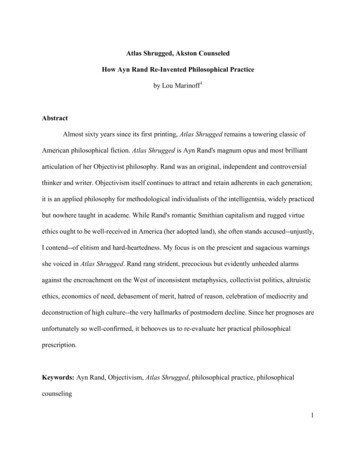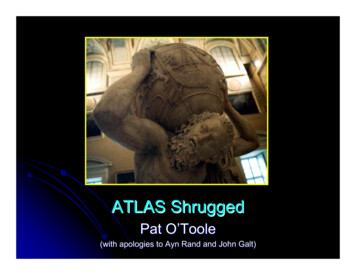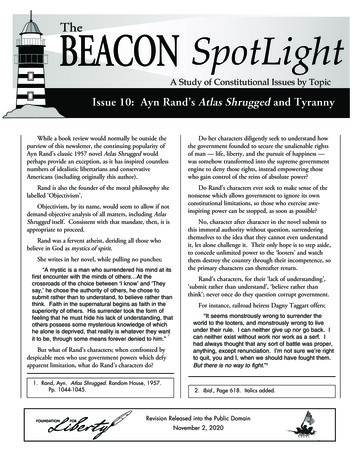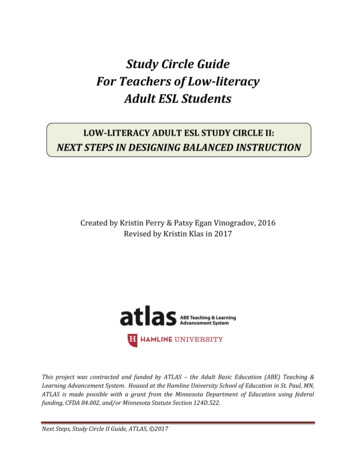
Transcription
Atlas Shrugged, Akston CounseledHow Ayn Rand Re-Invented Philosophical Practiceby Lou Marinoff 1AbstractAlmost sixty years since its first printing, Atlas Shrugged remains a towering classic ofAmerican philosophical fiction. Atlas Shrugged is Ayn Rand's magnum opus and most brilliantarticulation of her Objectivist philosophy. Rand was an original, independent and controversialthinker and writer. Objectivism itself continues to attract and retain adherents in each generation;it is an applied philosophy for methodological individualists of the intelligentsia, widely practicedbut nowhere taught in academe. While Rand's romantic Smithian capitalism and rugged virtueethics ought to be well-received in America (her adopted land), she often stands accused--unjustly,I contend--of elitism and hard-heartedness. My focus is on the prescient and sagacious warningsshe voiced in Atlas Shrugged. Rand rang strident, precocious but evidently unheeded alarmsagainst the encroachment on the West of inconsistent metaphysics, collectivist politics, altruisticethics, economics of need, debasement of merit, hatred of reason, celebration of mediocrity anddeconstruction of high culture--the very hallmarks of postmodern decline. Since her prognoses areunfortunately so well-confirmed, it behooves us to re-evaluate her practical philosophicalprescription.Keywords: Ayn Rand, Objectivism, Atlas Shrugged, philosophical practice, philosophicalcounseling1
IntroductionAyn Rand is an original, independent, and controversial force in American intellectual life.She was born and educated in Europe, but emigrated to this country convinced that it was the onlyplace in which she could earn complete liberty to write as she saw fit. And she was, by precociousavocation, a writer: this she had decided for herself at age nine. Rand's American saga is almostunremarkable in its remarkability: she arrived here penniless and friendless, subsisted through asuccession of odd and often menial jobs, until by dint of her prodigious talent and unflinchingintegrity, she attained a stature sufficient for the production of her mature and lasting works. Thusher biography reads like a run-of-the-mill American success story told millions of times over, savethat the immigrant norm for the socio-economic transition from utter impecuniosity to materialcomfort is probably closer to three generations than one. Nonetheless, persons of unusual vitalityand ability are supposedly able to run the race in faster time; Ayn Rand, for one, certainly filled theunforgiving minute to the brim.In my view, Rand is original because she founded a hitherto uncognized school ofphilosophical thought and deed, primarily a doctrine for romantic capitalists, called Objectivism.Her originality is also evident in that she espoused her philosophy primarily through literary fiction,the medium which most conspicuously displays her gifts. She is independent because although herphilosophy was taken up and practiced by an intelligentsia partly grounded in the academy, sheherself held no academic post. Her independence is fiercely personal, but it is neither anti-socialnor aloof: it is based on her ability to produce and market her philosophy as an industry. She prefersby nature to be self-employed. Rand is controversial because the pillars of her philosophy aremethodological individualism (in the tradition of Carlyle and Popper), logical empiricism (in the2
scientific tradition from Bacon onward), and deontological virtue ethics (in the traditions ofAristotle and Kant). The moral, social and political components of her philosophy repose squarelyupon these pillars.Now you may ask: wherein does the controversy lie? Is not America pioneered and built onrugged and unabashed individualism? Is not America a world leader in the scientific enterprise? Isnot America famous for its silent "moral majority", which (from Tocqueville to USA Today) is saidto inculcate unsophisticated but wholesome moral intuitions? I must offer a Talmudic response tothese apparently rhetorical questions, an answer of which neither Aristotle nor Rand wouldapprove: "Yes but no."Ayn Rand is reviled by the moral majority because she appears to be an elitist. WhileAmerica rewards its elite as has no empire since Rome, it does so on the express unspokencondition that they shall not pretend to be superior to anyone else. So while Rand openly celebratesmeritocracy, America hushes it up. Ayn Rand would also be reproved by any Americananti-intellectual with sufficient acumen to read her. As there are probably none left, she isposthumously spared their despite. Yet there have always stirred profound currents of irrationalismin this republic, which revere physicality at the expense of mentality. Athletes are loved; coaches,hated. Astronauts are famous; astrophysicists, unknown. Actors and actresses are worshipped;directors and writers, disrespected. Homeopathists are championed; allopathists, denounced.Psychics are consulted; scientists, uncomprehended. Evangelists are televised; rationalists,marginalized. Ayn Rand is also reviled by moral consequentialists of every stripe, and in particularby contemporary social engineers bent on manufacturing and distributing their versions of"fairness" and "justice" and "truth" at any and all costs, even if the capstones of their edifice are3
yanked from its very foundations. Small wonder that they condemn Ayn Rand: her magnum opusdescribes, in excruciating detail, the implosion of that edifice in the wake of their deconstructionof it. She pitilessly exposes how the moral deficits of coerced altruism become manifest asintellectual bankruptcy, social suicide, political thuggery and economic collapse. The victims ofher apocalyptic vision are all self-made: they begin by refusing to acknowledge the philosophicaldistinction between objective fact and subjective value, and end by refusing to allow theirunexamined hypotheses to be informed and modified by incontrovertible experience.Rand's originality, independence and controversiality persist. She is an unfashionablemeritocrat in a season of rabid mediocrity. She is an unheeded rationalist in an age of mindlessfeel-goodism. She is a jarring egoist in an ethos of overzealous altruism. She made an earlydiagnosis of the malignant philosophical cancer of her times, in a word "collectivism", which hasmetastasized throughout ours. In prescribing treatments for it, she re-invented fundamental aspectsof philosophical practice. It is my present task-and possibly duty-to illuminate her re-invention.Rand's complete works include novels, essays, and plays. Although all her works havephilosophical content, and all explore facets of her Objectivism, it is her novels that most lucidlyand powerfully convey her philosophical message. Her plays are virtually unstageable; her essays,surprisingly sophomoric. But the nucleus of her literary fiction, consisting of two massive novels(The Fountainhead and Atlas Shrugged) is to be reckoned among immortal works of apocalypticphilosophical fiction. I had always thought of The Fountainhead and Atlas Shrugged as a colossalliterary Prelude and Fugue, and was therefore cheered to encounter Ayn Rand's owncharacterization: she wrote "The Fountainhead was only an overture to Atlas Shrugged" (1992,p.1085). Her musical metaphor is sharper than mine; now let us attend her symphony.4
Philosophical ContextAtlas Shrugged is mainly the story of a brother and sister: James and Dagny Taggart. Theyare great-grandchildren of a railroad magnate, Nathaniel Taggart, whose single vision andindomitable will built Taggart Transcontinental, which becomes the leading railway in America.Heirs to this industry, James and Dagny are reared to run it. James, the elder, becomes President;Dagny, the younger, becomes Vice-President in charge of Operations. James Taggart is pampered,indecisive, weak-willed and mean-spirited. Moreover, he believes that he is "owed" respect andthat he "commands" obedience because of the position he inherited, irregardless of his ability orinability to occupy it. In fact, he is administratively incompetent, unable to discharge any duty, andhe maintains a pathetic facade of authority but leaves the actual running of the railroad entirely tohis sister. Dagny Taggart is the antithesis of her brother: disciplined, decisive, strong-willed, andhigh-spirited, she earns the respect and commands the obedience of her employees--most of whomare men--because she leads by competent example. Her fellow captains of industry find it highlyunusual that a woman should be doing this kind of work (indeed, it was unthinkable when Randconceived and wrote the novel), but Dagny Taggart rises above what we today call "sexism" by herconspicuous and consistent competency. Time and again Rand has Dagny Taggart commune andidentify with the bust of Nathaniel Taggart, which perches unnoticed by travellers on a lofty ledgein New York's bustling Taggart Terminal. Implicitly, Rand informs us that Dagny carriesNathaniel's genes for leadership. Time and again, Dagny remembers his history, and rediscovers inhis tradition the inspiration to solve problems and overcome obstacles placed in her path.And even in this cursory contrast between James and Dagny Taggart, one perceives thestrong outlines of Rand's methodological individualism. It would never have occurred to Dagny5
Taggart--as it never would have occurred to Ayn Rand, who expressed her philosophy throughDagny--to seek advantage via a collectivized culture, be it membership in a so-called "historicallydisadvantaged group" or in any other cult of victimhood. Dagny Taggart's femaleness is not on anypolitical or economic agenda set by her. As the plot unfolds, Dagny finds ample opportunity toexplore her womanhood in appropriately romantic and eventually marital contexts; but nowheredoes she allow sex or gender to interfere with the rational functions she performs as a professional.Although male peers may initially regard her as a female simpliciter (and the Hobbesist in Randportrays this as no sin either, merely as instinctive biological response), these same male peers aresoon compelled to see her as a Vice-President of Operations of a major railroad. I emphasize thatthey are compelled to see her thus not by any legislation, policy, propaganda, sensitivity-training,bribe of sexual favors, threat of sexual harassment suit, or other form of external coercion; rather,by Dagny Taggart's conspicuous and consistent competency.And this is one kernel of Objectivism: that it requires certain definitive skills to do aparticular job properly, and that a person's gender (or color, or age) is irrelevant to that person'spossession of said qualifications. Nor does Rand even care a fig for equal opportunity: on her view,the most daring and perforce useful innovations, in both thought and deed, have always been theproduct of unequal opportunity. Genius is rarely recognized in the first instance; rather, isstridently opposed by cultural inertias of its age. Geniuses therefore have less initial opportunity todisplay their brilliance than do mediocrities their drabness. For Rand, unequal opportunity is thusone further hurdle to be surmounted, and her heroes and heroines vault it without rancor. For them,it is part and parcel of accomplishment. In a Randian meritocracy, no Bach could be preventedfrom producing compositions, no Newton could be prevented from explicating nature; and no6
Taggart can be prevented from running the Transcontinental Railroad at a profit.One must appreciate that Rand is a naively romantic capitalist, in the tradition of AdamSmith. That is, she deems the individual's self-interest uniquely necessary and completelysufficient for the realization of the so-called "common good." For her, the phrase "common good"has no meaning other than a summation over individual accomplishment. Thus her ethic isegocentric but by no means strictly deontological. She bids each to live for his own sake, and notfor the sake of another. So her consequentialism is vehemently anti-altruistic. In fact, herapocalyptic vision is triggered by none other than coerced altruism: when each attempts or pretendsto live solely for the sake of others, the entire political economy collapses, until no-one is able evento subsist. Rand's noble captains of industry do not accumulate profit for the sake of generatingwealth; rather, they generate wealth for the sake of accumulating profit. They are beholden tono-one but themselves, and dependent only on like-minded peers with whom they have enteredinto contracts. Each one fulfills his contract for the primary purpose of furthering his own interests,which are needless to say enhanced by his ability to fulfil his own contractual obligations. This sumof private interest in individual accomplishments leads men to engage the best talents they can find,and brings out the best in their employees at every level. Each job is therefore supremely important,in so far as it can be done well or badly; but not each job is equal in importance, as not each can bedone by all.In Rand's romanticized vision of industry, the steel-mill owner can indeed sweep the floors,and will gladly pick up a broom at any time if need be. This is because he was not merely born toinherit a steel-mill; rather because either he built it from nothing himself (in which case he wieldeda broom at some time) or he stood to inherit it but was obliged by his own ethic to learn the meanest7
job therein, the better to preside over the whole (in which case he wielded a broom at some time).On Rand's view, there is no shame in a future or even a present steel-mill owner wielding a broom;but there is shame in his not knowing how to wield a broom while pretending to be "better" thanhis hired sweepers. And conversely, there is no shame in being a hired sweeper in a steel mill, forone can take pride in doing any job well; but there is shame in a hired sweeper pre
Atlas Shrugged is mainly the story of a brother and sister: James and Dagny Taggart. They are great-grandchildren of a railroad magnate, Nathaniel Taggart, whose single vision and indomitable will built Taggart Transcontinental, which becomes the leading railway in America. Heirs to this industry, James and Dagny are reared to run it. James, the elder, becomes President; Dagny, the younger .











